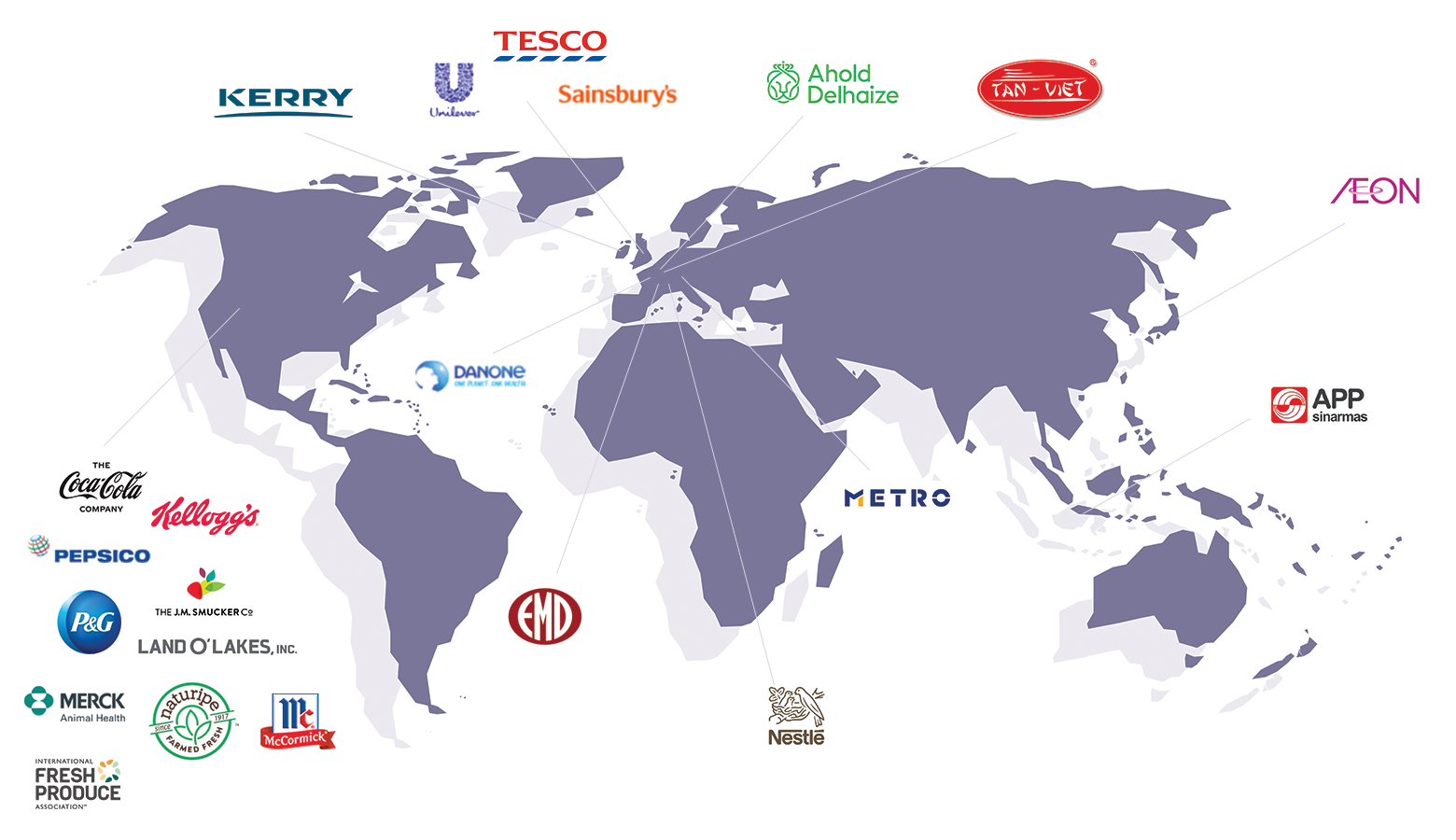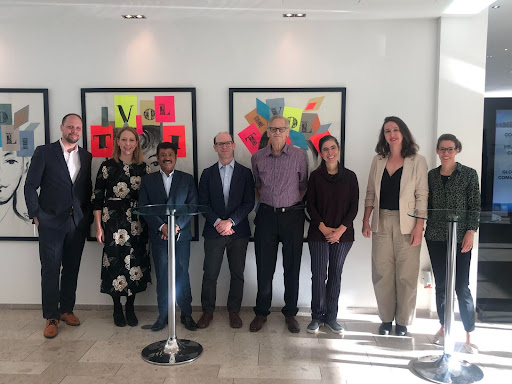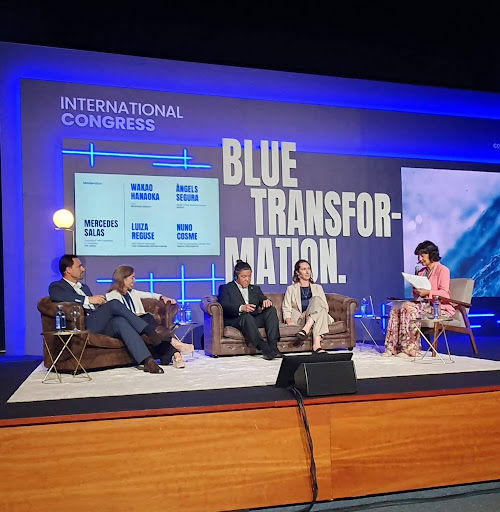Episode 7
Building Trust in Social Compliance: SSCI’s Social Benchmark Tool
with Luiza Reguse
 Passionate about the profound impact of food production on both people’s lives and the environment, Luiza Reguse embarked on her journey in the world of organic certification while still pursuing her university education. With over five years of experience as a Quality Manager and auditor at a Certification Body, she has gained a deep understanding of organic production regulations and quality management, with a particular focus on ISO/IEC 17065 and ISO/IEC 19011 standards.
Passionate about the profound impact of food production on both people’s lives and the environment, Luiza Reguse embarked on her journey in the world of organic certification while still pursuing her university education. With over five years of experience as a Quality Manager and auditor at a Certification Body, she has gained a deep understanding of organic production regulations and quality management, with a particular focus on ISO/IEC 17065 and ISO/IEC 19011 standards.
Luiza’s professional journey has been enriched by extraordinary experiences, such as conducting on-site assessments of riverside açaí producers in the Amazonian forest to ensure compliance with European Organic Rules. She’s also had the privilege of traveling to the Colombian jungle to participate in NOP-USDA certification audits in cocoa plantations, and explore the vineyards of Chile during different organic assessment processes. Upon relocating to France, her focus shifted towards implementing in Europe different organic certification standards from non-European regions like China, Taiwan, Mexico, and Brazil, in addition to engaging with emerging sustainable standards such as GlobalG.A.P and Rainforest Alliance.
In 2023, Luiza had the pleasure of joining the Consumer Goods Forum as Senior Manager of the Sustainable Supply Chain Initiative (SSCI), a coalition of actions focused on supports organisations in their supply chain due diligence by driving harmonisation in the complex sustainability landscape.

The Consumer Goods Forum’s Sustainable Supply Chain Initiative
The Consumer Goods Forum is a global, parity-based industry network that is driven by its members to encourage the global adoption of practices and standards that serve the consumer goods industry worldwide. It brings together the CEOs and senior management of some 400 retailers, manufacturers, service providers, and other stakeholders across 70 countries, and it reflects the diversity of the industry in geography, size, product category and format. Its member companies have combined sales of EUR 4.6 trillion and directly employ nearly 10 million people, with a further 90 million related jobs estimated along the value chain. It is governed by its Board of Directors, which comprises more than 55 manufacturer and retailer CEOs.

Consumer goods companies are working to contribute efforts to reach the UN Sustainable Development Goals and achieve the 2030 agenda through supply chain due diligence. Ensuring supply chains respect sustainability standards at all levels is key to protecting people, products, and the planet, whether supply chains are large or small, global or local, at-sea or on land. Organisations do this by using third-party auditing, monitoring and certification schemes to ensure their suppliers provide decent working conditions to their employees, source their materials sustainably and respect the environment.
With hundreds of schemes on the market to choose from, and dozens more emerging each year, it can be challenging for organisations to know which scheme to trust. The decision becomes more challenging given that not all auditing, monitoring, and certification schemes cover social and environmental sustainability measures the same way, resulting in distrust in audits and misalignment in the industry.
It was in this context that the SSCI was created in 2019: by the industry and for the industry, to support organisations in their supply chain due diligence by driving harmonisation in the complex sustainability landscape.
GSSI-SSCI Collaboration
The FAO now estimates that 600 million people rely on fisheries and aquaculture for their livelihood, 500 million of them in small-scale fisheries. However, it is one of the most at-risk industries from a social sustainability perspective where limited safeguards to protect seafood workers are prevalent.
GSSI and the SSCI partnered in 2018 bringing together GSSI’s expertise and success in working with seafood certification schemes and SSCI’s extensive social compliance background. Together, the seafood industry-specific benchmarking requirements were developed for at-sea operations and primary production (aquaculture) within the SSCI Social Benchmark Tool.
The tool aims to ensure confidence in social compliance programs for seafood by setting standards for social auditing and providing formal recognition based on a rigorous and transparent benchmark process that considers the specificities of the seafood sector and the special nature of work in food harvesting. If all criteria are met through the benchmarking process, the scheme can receive SSCI Recognition.
SSCI has today 5 recognized schemes.
Thanks to the SSCI Benchmark, GSSI Partners have one clear reference point for what constitutes credible auditing criteria and which social certification has proven to provide this.
Luiza, it’s great that schemes have begun the social benchmarking process and are being recognized. What impact will the Social Benchmark Tool have on the industry?
The introduction of the SSCI Social Benchmark Tool marks a significant milestone for the industry, bringing a new level of rigour and credibility to social compliance efforts. Our criteria, underpinned by key international frameworks such as the ILO Conventions and Recommendations, the UN Guiding Principles on Business and Human Rights, and aligned with the Consumer Goods Forum’s Priority Industry Principles on Forced Labour, ensure that recognized schemes adhere to industry-agreed minimum standards of social responsibility.
For the seafood industry, in particular, the Social Benchmark Tool fills a critical gap by driving access to a growing list of recognized social compliance schemes specific to the sector. This advancement is essential for promoting transparency and fair social practices throughout seafood supply chains globally. With SSCI recognition, these schemes can effectively demonstrate their commitment to robust social compliance, meeting and exceeding industry expectations.
By facilitating the recognition of credible social compliance schemes, the SSCI Social Benchmark helps address pressing social issues such as forced labour, promoting a more ethical and sustainable supply chain. This ultimately benefits not only the industry but also the communities and individuals who rely on it, fostering a culture of accountability and continuous improvement.
By facilitating the recognition of credible social compliance schemes, the SSCI Social Benchmark helps address pressing social issues such as forced labour, promoting a more ethical and sustainable supply chain.

There’s been a lot of news coming out recently about the validity of social auditing and what it can accomplish. How does the SSCI feel about this?
We are aware of the increasing scrutiny and discussions within the industry concerning human rights abuses and social compliance issues, which has raised valid questions about the effectiveness of social auditing. While social audits are an essential tool for identifying and addressing social compliance issues, they are not a standalone solution.
The SSCI Benchmark helps mitigate these concerns by setting rigorous standards that go beyond traditional auditing. It ensures that social audits are part of a broader strategy that includes continuous improvement, worker engagement, and effective grievance mechanisms. This comprehensive approach enhances the credibility and impact of social audits.
Ultimately, social audits should be accompanied by ongoing due diligence and robust governance frameworks to truly address and prevent human rights abuses in supply chains. The SSCI Benchmark supports this holistic approach, promoting transparency, accountability, and sustainable practices across industries.
The SSCI Steering Committee and Benchmark Leaders, Copenhagen October 2023
How does the SSCI ensure transparency and accountability in the assessment and recognition process?
The SSCI ensures transparency and accountability through a rigorous and structured assessment process comprising six stages, each designed to uphold the highest standards of integrity and clarity.

- Scheme Application: The process begins when a scheme applies to the SSCI, signaling their commitment to undergo a comprehensive review.
- Desktop Review: This is followed by a thorough desktop review conducted by an independent SSCI expert Benchmark Leader (BL), who evaluates the scheme against SSCI’s criteria.
- Office Visit with Independent Benchmark Leader: The SSCI team, along with the Benchmark Leader, conducts an on-site office visit. This step provides an in-depth assessment and ensures that the scheme’s practices align with its documentation.
- Public Consultation: To promote transparency, a public consultation is held, allowing stakeholders and the general public to review and provide feedback on the scheme’s performance and practices.
- Industry Review and SSCI Decision: The feedback from the public consultation is then reviewed by the industry and the SSCI Steering Committee, which evaluates the scheme against the benchmark requirements and makes a final decision.
- SSCI Recognition: If all criteria are satisfactorily met, the scheme is granted SSCI recognition, signifying its adherence to the highest standards of social compliance.
By integrating these rigorous steps, the SSCI guarantees that only those schemes that meet the stringent requirements are recognized, thereby ensuring transparency, accountability, and continuous improvement in social compliance across industries. You can find out all the requirements here.
How can precompetitive collaborations, such as the one between GSSI and SSCI, benefit the seafood industry?
Precompetitive collaborations, like the partnership between GSSI and SSCI, offer numerous benefits to seafood stakeholders, significantly enhancing the industry’s ability to address complex challenges and drive positive change. Some benefits include:
- Shared Knowledge and Resources: Collaborations allow stakeholders to exchange expertise and best practices, effectively addressing social responsibility issues.
- Innovation and Efficiency: Joint efforts foster innovation and efficiency by sharing ideas, developing new technologies, and streamlining processes in the seafood supply chain.
- Sustainability: Collaborative initiatives promote sustainable practices that benefit ecosystems and dependent communities, creating benchmarks for responsible fishing and aquaculture.
- Supply Chain Transparency and Traceability: Partnerships enhance transparency and traceability, combating illegal, unreported, and unregulated (IUU) fishing and ensuring responsible practices.
- Stakeholder Engagement and Alignment: Collaborations facilitate dialogue and cooperation among diverse stakeholders, aligning interests, building consensus, and driving collective action towards common goals.
In essence, pre-competitive collaborations benefit the seafood industry by fostering innovation, enhancing sustainability, and promoting responsible practices across the supply chain. By working together, we can address the complex challenges of the seafood industry more effectively and make a significant difference.
In essence, pre-competitive collaborations benefit the seafood industry by fostering innovation, enhancing sustainability, and promoting responsible practices across the supply chain.

In which aspects of the Tool do you foresee a need for further development, to effectively tackle forthcoming challenges?
With our members, as we look to the future, there are several aspects of the SSCI Benchmark Tool that we are excited to develop so that we can be sure to effectively address the changing pace of the industry and be ready for challenges and opportunities ahead. Some areas to note include:
- Expanding Scope to Recognize Environmental Standards: One significant area for development involves expanding the Benchmark’s scope to recognize environmental standards in additional sectors such as Manufacturing and Processing, Primary Production, and Forestry. By incorporating environmental criteria alongside social compliance, we can further enhance sustainability practices throughout the supply chain.
- Streamlining the Recognition Journey: Another aspect that warrants further development is the streamlining of the process for schemes to embark on the recognition journey. We recognise the importance of making this journey as seamless and valuable as possible for schemes. By continuing to refine our procedures and mechanisms, we aim to optimise the recognition process, ensuring that schemes receive maximum value from their participation.
- Enhanced Feedback and Consultation: Feedback and consultation have always been at the heart of the SSCI’s establishment. Moving forward, we see the need to strengthen these mechanisms further to guarantee SSCI’s continuous improvement and alignment across industry sectors. By actively seeking input from stakeholders, including schemes, industry experts, and consumer goods companies, we can ensure that the Tool remains relevant, effective, and responsive to emerging challenges and best practices.
By expanding the scope to include environmental standards, streamlining the recognition journey, and enhancing feedback and consultation mechanisms, we can continue to drive positive change and promote sustainability across global supply chains.
To find out more about the SSCI, visit our website and sign up to receive news and updates.
Luiza Reguse on a panel at Conxemar-FAO Congress 2023.






































![PSC002_PescamarVertical (1)[17]](https://ourgssi.org/wp-content/uploads/2022/02/PSC002_PescamarVertical-117.jpg)